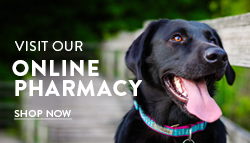Blog

The month of March is Pet Poison Prevention Awareness Month and by knowing what is harmful to your pets, you will be able to keep your pets healthy and safe.
Human Medications
Even though you may have heard that some medications can work for both humans and pets, many types of human medications, both prescription and over the counter, can be deadly for cats and dogs. This is why you should always consult your veterinarian before giving your pet any medications you may have at home and keep these medications in places that your furry friends can’t reach.
Cancer medicines
Antidepressants
Diet pills
Cold medications
Supplements, such as vitamins
Pain relievers, such as aspirin, acetaminophen, and ibuprofen
Chemicals
When it comes to chemicals, some of them, such as antifreeze, has a pleasant taste that can be appealing to animals. So be sure to keep all chemicals and insecticides locked up. This includes common household chemicals such as bleach and detergents as well as insect bait, herbicides, and fertilizers, which are all toxic.
Also, be sure to be careful when using de-icing salts since your pets may walk through them and then lick their paws. Even commonly used chemicals for dogs, such as tick medication, collars, and shampoos can be toxic.
Human Food
It is not uncommon for your pet might to beg for food whenever you sit down for a meal. However, some types of foods are poisonous for cats and dogs including garlic, onions, caffeine, and alcohol. To be on the safe side, avoid feeding your pet human foods.
Some types of houseplants, such as poinsettias and lilies, are harmful to cats. Many cats enjoy nibbling on houseplants, so keep them out of reach or out of the house. While not necessarily toxic, you should never give chicken bones to a cat or dog because the bones are soft and can break apart, causing internal injuries.
Other Hazards
Cats especially love to play with string, yarn, and similar toys. However, these items can strangle or choke your cat. Some cats like to chew string to pieces and end up swallowing them which can, in extreme cases, block or become wrapped around your cat’s intestines.
What to Do If Your Pets Are Poisoned
If you think that a pet has swallowed one of these poisons, every second counts. Your first step should be to call your vet which should be kept in an easy-to-reach place, such as on the refrigerator.
You can also call the Animal Poison Control center at (888) 426-4435. Depending on the poison that was swallowed, they can help you decide on the next steps. You’ll want to keep an eye out for symptoms in your pet. Some of which may show up right away while others may take longer to appear. Common symptoms of poisoning include difficulty breathing, coughing, diarrhea, depression, shaking, vomiting, and weakness.
If you would like more information on potentially harmful substances for your pet, or to schedule an appointment, please contact Bergen County Veterinary Center in Waldwick, NJ, or give us a call today at 201-205-2500.






